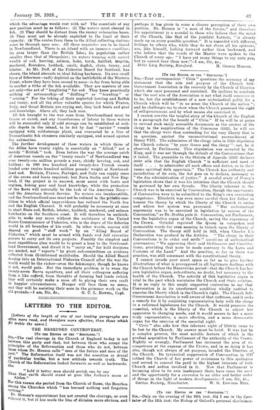[To me EDITOR OT THE " SPECTATOR."] Sia,—Your correspondent "
Civis " questions the accuracy of my statement that the aim and purpose of the Church Self- Government Association is the recovery by the Church of liberties which she once possessed and exercised. He inclines to conclude that the real aim of the Association is not what itself conceives it to be, but the establishment of a new ecclesiastical polity for a Church which will be " in no sense the Church of the nation "; and he challenges me to show when the Church possessed the right of self-government and by what means she exercised it.
I cannot rewrite the tangled story of the Church of the English in a paragraph for the benefit of " Civis." If he will be at pains to re-read such easily accessible documents as the answer of the clergy to the supplications of the Commons (1532), he will see that the clergy were than contending for the very liberty that is in question, against the unconstitutional encroachment of Henry. VIII. The submission of the clergy (also in 1532) stipulates for Church reform "by your Grace and the clergy "—not, be it observed, by Parliament. This stipulation was accepted by the King, and it was not through the default of the Convocations that it failed. The preamble to the Statute of Appeals (1533) declares inter alia that the English Church " is sufficient and meet of itself . . . to administer all such offices and duties, as to their rooms spiritual doth appertain." The Church has authority and jurisdiction of its own, the Act goes on to declare, necessary to " the due administration of justice." A careful study of Henry's legislation shows that it was his intention that the Church should be governed by her own Synods. The liberty inherent in the Church was to be exercised by Convocation, though the enactments of Convocation were to be submitted to the King's own overriding competence. Elizabeth was even more careful than her father to honour the theory by which the liberty of the Church to revise and adjust her system was presumed. " Her ecclesiastical supremacy was to be exorcised in legislation by canons of the Convocation," as Dr. Stubbs puts it. Convocation, not Parliament, was the legislative organ of the Church, saving the supremacy of the Crown. Grindal reproved the Queen in outspoken and memorable words for even seeming to trench upon the liberty of Convocation. The theory still held in 1625, when Charles L's Declaration was prefixed to the Articles. " The clergy in their Convocations is to order and settle " questions of ecclesiastical provenance; "We approving their said Ordinances and Constitu- tions; providing that none be made contrary to the Laws and Customs of the Land." And the practice, so far as there was practice, was still consonant with the constitutional theory.
I cannot invade your scant space so far as to give further illustrations of what is presupposed in all legitimate dealings with the Church before the Hanoverian period—that the Church has her own legislative organ, subordinate, no doubt, but necessary to the health of the Church. The activity of this legislative organ is vital to the pact which maintains the Church and State relation. It is no reply to this amply supported contention to say that Convocation is in its unreformed condition wholly unfitted to exercise the liberty which is the Church's right. The Church Self- Government Association is well aware of that unfitness, and it seeks a remedy for it by conjoining representative laity with the clergy in a reformed legislature for the Church. It would preserve the essential, which is the liberty of the Church to adjust her apparatus to changing needs, and it would secure to her a more truly representative, a more effective, and a more democratic organ for the exercise of the essential right.
" Civis " also asks how this inherent right of libdrty came to be lost by the Church. My answer must be brief. It was lost by a complex process, the most notable feature of which is the gradual acquisition by Parliament of the authority of the Crown. Rightly or wrongly, Parliament has increased the area of its competence at the expense of the Crown, and in so doing it has also, though not always of set purpose, invaded the liberties of the Church. Its tyrannical suppression of Convocation in 1717 robbed the Church of her power of resistance to this spoliation and served to conceal the peril to the highest interests of both Church and nation involved in it. Now that Parliament is becoming alive to its own inadequacy there have come the need and the opportunity for a reversion to an older and better order of things in the light of modern developments.—I am, Sir, &c.,


































 Previous page
Previous page